九年级第一单元知识点_仁爱英语 (1)
九年级上册英语笔记仁爱版
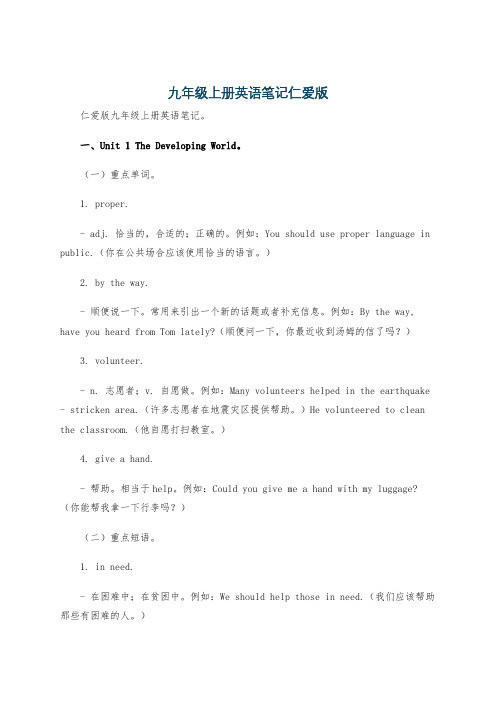
九年级上册英语笔记仁爱版仁爱版九年级上册英语笔记。
一、Unit 1 The Developing World。
(一)重点单词。
1. proper.- adj. 恰当的,合适的;正确的。
例如:You should use proper language in public.(你在公共场合应该使用恰当的语言。
)2. by the way.- 顺便说一下。
常用来引出一个新的话题或者补充信息。
例如:By the way, have you heard from Tom lately?(顺便问一下,你最近收到汤姆的信了吗?)3. volunteer.- n. 志愿者;v. 自愿做。
例如:Many volunteers helped in the earthquake - stricken area.(许多志愿者在地震灾区提供帮助。
)He volunteered to clean the classroom.(他自愿打扫教室。
)4. give a hand.- 帮助。
相当于help。
例如:Could you give me a hand with my luggage?(你能帮我拿一下行李吗?)(二)重点短语。
1. in need.- 在困难中;在贫困中。
例如:We should help those in need.(我们应该帮助那些有困难的人。
)2. come for a visit.- 来参观;来访问。
例如:My friends will come for a visit next week.(我的朋友们下周将来参观。
)(三)重点句型。
1. Have you come back from your hometown?- 这是一个现在完成时的一般疑问句。
其结构为“Have/Has+主语+过去分词+其他”。
回答可以是Yes, I have.或者No, I haven't.2. There goes the bell.- 这是一个倒装句。
仁爱版九年级上册英语Unit1Topic1知识点

仁爱版九年级上册英语Unit1Topic1知识点Unit 1 Topic 1※短语集锦1.have a good summer holiday 暑假过得好2.take place 发生3. have / has been to 去过某地(去而已归)have / has gone to 去了某地(去而未归)4. so many / few + 可数名词复数+ that… 如此多…以至于…So much / little +不可数名词+ that…如此少的…以至于…5. a proper place to take photos / pictures一个适合拍照的地方6. by the way 顺便问一下7. There goes the bell = The bell is ringing = That’s the bell 铃声响了8. take part in = join in = be in +某项活动join + sb / club / team /组织9. tell a story to sb 给某人讲故事10. feed the disabled children 喂残疾儿童11. What a wonder experience! 多么精彩的一次经历啊!12. learn a lot from … 从…中学习到很多13. have no time to do sth 没有时间做某事14. chat on line 上网聊天15. around the world = all over the world 全世界16. have a hard life = live a hard life 过着艰苦的生活Life is hard for sb 对某人来说生活是艰难的17. in detail 详细地18. in the past 在过去at present 现在in the future 将来19. Is that so? = Really? 真的吗?真是那样吗?20. in order to = so that = in order that 为的是;以便于in order to 后+动词短语so that / in order that后+ 句子21. support a family 供养一个家庭give support to 给…提供帮助22. day and night 日日夜夜23. What about you? = How about you? 你呢24. Now our country has developed rapidly.现在我们国家发展迅速developed:发达的developing:发展中的development:发展eg:1)China is a developing country.2) Japan is the only developed country in Asia.3) With the development of China, people’s living conditions become better andbetter.25. get / have / receive a good education 接受良好的教育26. have a balanced diet 均衡膳食27. more than = over 超过; 多余28. see … oneself 亲自看到29. in the 1968s 在二十世纪六十年代30. the living conditions 生活条件31. have a chance to do 有机会做某事32. keep in touch with 与某人保持联系get in touch with 与某人取得联系33. by letter or telegram 靠信件或电报34. things to choose from 供挑选的东西35. sorts of = kinds of 多种36. not only … but also … 不但….而且…37. Wha t’s more 而且38. make progress 取得进步make rapid progress 取得快速的进步make great progress 取得巨大的进步39. succeed in doing sth = be successfulin doing sth 成功做某事eg: Beijing succeeded in hosting the 29thOlympic Games in 2008. (同义句)= Beijing was successful in hosting the 29thOlympic Games.40. It’s important for sb to do sth 做…对某人是重要的41. dream about / of doing sth 梦想做某事42. watch a movie in the open air 看露天电影43. with the help of = with one’s help 在某人的帮助下44. draw up 拟定;起草45. thanks to … = because of 多亏;由于46.check over = look over 检查※精讲精析Section A1.have / has been to 去过某地(去而已归)与ever, never, before及次数等连用have / has gone to 去了某地(去而未归)have / has been in 表示在…已经多久了eg:用been, gone, in填空1)_ Where have you ?_ I have to a shopping center.2)_ Where is Maria?_ She has to Cuba.3)_ Has your mother ever there?_ No, she has never there.4)She has to England. She will come back in ten days.5)He has to Xian many times.6)He has been China for two years.7)How long have you been in this city?2. so ... that ... / such ... that ...都可意为如此...以至于...区别如下:1)so +形容词+ a / an + 单数名词= such + a / an + 形容词+ 单数名词eg:1) It is so moving a movie that all of us can’t help crying.(同义句)= It is such a moving movie that all of us can't help crying.2) It is so interesting a book that I read it again and again. (同义句)2) 如果名词是可数名词复数或不可数名词时这时只能用such , 不能用so3) 如果名词前有many , much , little, few时只能用so,不能用such.练习:用so / such 填空1) The boy is young that he can’t go to school.2) She told us a funny story that we all laughed.3) He has few books to read that he has to borrow some from the school library.4) It is a tall building that I can’t see its top.5) The old man is ill that he can’t get u p.6) It was fine weather that we went swimming last weekend.7) They are small children that they can’t go to school.8) She speaks English well that the teacher praises(表扬)her.9) There is little bread that it is not enough for many people.10) It is delicious food that we all like it very much.3. There goes the bell.(同义句)= The bell is ringing.= That’s the bell.4.I want to work hard to make my English better.(同义句)= I want to work hard to improve myEnglish.注意:so ... that 句型的否定可与too ... to 句型和not enough ... to do 句型进行转换eg:1) Tom is so young that ha can’t go to school. (同义句)= Tom is too young to go to school.= Tom isn’t old enough to go to school.2)The desk is so heavy that I can’t move it. (同义句)= The desk is too heavy for me to move.= The desk i sn’t light enough for me to move.3)The apple tree is so tall that we can’t reach it.(同义句)= The apple tree is too tall for us to reach.= The apple tree isn’t short enough for us to reac h.5.1) I have been to Beijing.(提问)Where have you been?2) Lily has been to Cuba.(提问)Where has lily been?3) My sister has gone to the gym.(提问)Where has your sister gone?4) They have gone to Shanghai.(提问)Where have they gone?Section B1.in a disabled children’s home在残疾儿童之家2.experience 在此处意为经历What a wonderful experience!一次多么棒的经历啊!experience还可意为经验讲,作经验讲时它是一个不可数名词eg: The teacher has a lot of teaching experience.这个老师有许多教学经验。
仁爱英语九年级unit1topic1知识点归纳

G9 Unit 1 Topic 1Topic 1 Our country has developed rapidly.一、重点词汇(一)换1. training -- train “训练”(v.)2. rapid (adj.)--- rapidly(adv.)3. recent (adj) -- recently(adv.)4. develop (v.) -- development (n.) -- developed “发达的”;developing “发展中的”(adj.)5. narrow (反义词 ) -- wide ( 二) 重点短语 ★SA8. have the chance to do sth.有机会做 某事 1. have a good summer holiday9. receive a good education 接受良好的教育过一个愉快的暑假 10. keep in touch with sb by letter or telegram 2. come back from ⋯从⋯ ⋯ 回来通过书信或电报与某人取得联系 3. take place 发生4. have/ has been to... 去过⋯ ⋯5. so... that... 如此⋯ ⋯ 以至于6. improve my English 提高我的英语水平7. by the way 顺便问一问8. have/ has been to... 已经去了 ★SB11. far away 遥远12. the reform and opening-up 改革开放 13. taller and brighter 又高又明亮14. satisfy one ’s needs 满足某人的需要 15. not only ⋯ but also ⋯ 不但⋯ ⋯ 而且⋯ ⋯ 16. enjoy good medical care1. take part in 参加2. volunteer activities 志愿者活动3. in a disabled children ’s home 在一家残疾儿童养育院4. feed sb. 喂某人5. a wonderful experience 一次精彩的经历6. learn ⋯ from 从⋯ ⋯ 当中学习7. had (no) time to do sth. 有(没)时间 做 ⋯ ⋯8. put on funny shows for sb 为某人表演有趣的节目9. a group of 一组,一群 10. something meaningful 一些有意义的事情享受很好的医疗保健 17. what ’s more 而且 18. make rapid progress取得很大 /快速进步19. succeed in doing sth 成功地做 某事 20. remember the past 记住过去 21. live in the present 立足现在 22. dream about the future 展望未来 23. the course of ⋯ ⋯ 的过程 ★SD1. leisure activities 休闲活动2. play an important part in在⋯ ⋯ 中发挥重要作用11. do some farm work 干一些农活 ★SC1. in the past 在过去2. at present 现在3. more than 超过,多于4. see . oneself ⋯ 亲眼看 见 ⋯ ⋯5. living conditions 3. play hide-and-seek 捉迷藏4. play chess 下棋5. in one's spare/free time 在某人空闲时6. spend ... on sth.花费 ⋯ ⋯ 在⋯ ⋯ 上7. various kinds of 各种各样8. both... and... 不仅 ⋯ ⋯ 而且⋯ ⋯在⋯⋯1二、重点句型。
仁爱版九年级上册英语知识点

仁爱版九年级上册英语知识点一、Unit 1 The Developing World。
1. 重点单词。
- describe:v. 描述;形容。
例如:Can you describe your new school?- provide:v. 提供;供应。
常用搭配:provide sb. with sth.或者provide sth. for sb.,如:The school provides us with a good learning environment.- remain:v. 保持;依然。
可作系动词,后接形容词等作表语,例如:He remained silent at the meeting.- increase:v. & n. 增加;增长。
increase by表示“增加了……”,increase to表示“增加到……”。
2. 重点短语。
- be short of:短缺;缺乏。
例如:The area is short of water.- so far:到目前为止,常与现在完成时连用。
如:So far, we have learned a lot in this semester.- take place:发生,通常指有计划、有安排地发生,没有被动语态。
例如:The sports meeting will take place next week.3. 重点句型。
- It is + adj. + for sb. to do sth.:对某人来说做某事是……的。
例如:It is important for us to protect the environment.- have/has been to与have/has gone to的区别:- have/has been to表示“去过某地(已经回来)”,例如:I have been to Beijing twice.- have/has gone to表示“去了某地(还没回来)”,例如:He has gone to Shanghai on business.二、Unit 2 Saving the Earth。
仁爱版九年级上册第一单元Topic 1知识点
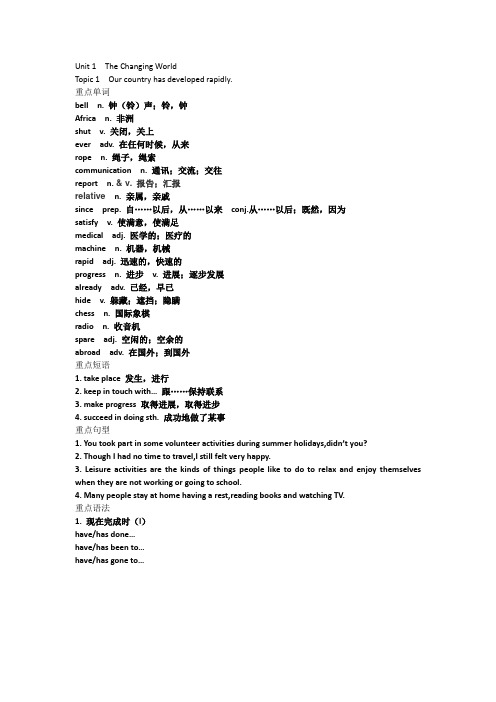
Unit 1The Changing WorldTopic 1Our country has developed rapidly.重点单词bell n. 钟(铃)声;铃,钟Africa n. 非洲shut v. 关闭,关上ever adv. 在任何时候,从来rope n. 绳子,绳索communication n. 通讯;交流;交往report n. & v. 报告;汇报relative n. 亲属,亲戚since prep. 自……以后,从……以来conj.从……以后;既然,因为satisfy v. 使满意,使满足medical adj. 医学的;医疗的machine n. 机器,机械rapid adj. 迅速的,快速的progress n. 进步v. 进展;逐步发展already adv. 已经,早已hide v. 躲藏;遮挡;隐瞒chess n. 国际象棋radio n. 收音机spare adj. 空闲的;空余的abroad adv. 在国外;到国外重点短语1. take place 发生,进行2. keep in touch with…跟……保持联系3. make progress 取得进展,取得进步4. succeed in doing sth. 成功地做了某事重点句型1. You took part in some volunteer activities during summer holidays,didn’t you?2. Though I had no time to travel,I still felt very happy.3. Leisure activities are the kinds of things people like to do to relax and enjoy themselves when they are not working or going to school.4. Many people stay at home having a rest,reading books and watching TV.重点语法1. 现在完成时(I)have/has done…have/has been to…have/has gone to…。
九年级仁爱版unit1知识点

九年级仁爱版unit1知识点九年级仁爱版Unit 1知识点九年级是一个学习和成长的关键时期,而仁爱版教材Unit 1是我们学习英语的开始。
在这个单元中,我们将学习很多有趣和实用的知识点,以下是一些重要的内容:一、动词的时态动词的时态是学习英语的基础,Unit 1中涉及到了一些常用的时态,比如一般现在时、一般过去时和一般将来时。
在句子中使用正确的时态可以让我们表达自己的意思更清晰、更准确。
例如,在一般现在时中,我们使用动词原形来表达现在的状态或经常性的动作。
比如,“I love to read books”(我喜欢阅读书籍)。
在一般过去时中,我们使用动词的过去式来表达过去发生的事情。
比如,“She studied English last night”(昨晚她学习了英语)。
在一般将来时中,我们使用“will”加动词原形或者be going to加动词原形来表达将来要发生的事情。
比如,“I will go to the movie theater tomorrow”(明天我将去电影院)。
二、名词的单复数名词的单复数也是英语学习中的基础内容之一。
在Unit 1中,我们学习了如何正确地使用名词的单复数形式。
一般来说,名词加s表示复数,但也有一些特殊情况需要记住。
当名词以s、x、ch、sh结尾时,加es表示复数。
比如,“I have two watches”(我有两个手表)。
当名词以辅音字母+y结尾时,变y为i再加es表示复数。
比如,“I have many dictionaries”(我有很多字典)。
当名词以元音字母+y结尾时,直接加s表示复数。
比如,“I have three days off”(我有三天休假)。
当名词以o结尾时,有些名词加es表示复数,有些名词加s表示复数。
比如,“I eat two potatoes”(我吃了两个土豆),但是“I have two radios”(我有两台收音机)。
最新仁爱版英语九年级上册Unit1 Topic1知识点 完整版

Unit1 Topic1 SectionA1.高兴做某事be happy/glad to do sth.2.现在完成时:①定义:强调已经发生或完成的动作对现在造成的影响或结果。
②构成:助动词have/has+动词的过去分词③八大时态:三“一”:一般现在时,一般过去时,一般将来时两“现”:现在进行时,现在完成时三“过”:过去进行时,过去完成时,过去将来时3.回来come back=be back=return4.发生:take place (有计划地发生)happen(偶然发生)①What happened to you?②happen to do sth.碰巧做某事(注意:发生没有被动语态)5.越来越美more and more beautiful越来越热hotter and hotter6.去过某地(已回来)have/has been to···去了某地(没回来,强调不在说话现场)have/has gone to···7.如此······以致于①so+形容词+that结果状语从句②such+名词+that结果状语从句(注意:当句中有many,much,few,little表示数量时,均用so)8.拍照take photos=take pictures9.顺便问一下by the way在去······的路上on the way to···挡道,妨碍in the way用这方式in this way10.铃响了. There goes the bell.=That’s the bell.=The bell is ringing.11.来come--came--come 变成become--became--become去go--went--gone 带走take--took--taken是be--was/were--beenUnit1 Topic1 SectionB1.现在完成时句式变化:肯定句:He has cleaned the room.否定句:He hasn’t cleaned the room.一般疑问句:Has he cleaned the room?肯定、否定回答:Yes,he has. / No,he hasn’t.特殊疑问句:What has he done?2.参加,加入①take part in=join in=be in(后跟活动)②join后跟组织,join sb.3.以···为食feed on=live on喂养feed---食物food流血bleed---血液blood4.看见see--saw--seen 喂养feed--fed--fed学习learn--learned/ learnt--learned/ learnt制作;使make--made--made拥有;吃;喝have--had--had感觉feel--felt--felt 放置put--put--put做,干do--did--done 飞,放飞fly--flew--flown阅读read--read--read 遇见meet--met--met5.experience①经历:可数名词②经验:不可数名词experienced为形容词“有经验的”6.感叹句有三种:①What+名词②How+形/副③How+句子How time flies!(注意:“时间,风,雨,雪,三餐,人口,成功”等虽然是不可数名词,但若前面有形容词修饰时,必须用a/an)7.使役动词make的用法:①make sb.+形容词②make sb.+职务名词(职务名词前不能加a/an/the)③make sb. do sth.8.别的,其他的other+复数名词=others9.任何别的any other+单数名词(同一范围内比较)10.虽然though不能与but连用,因为because不能与so连用.11.没有时间做某事have no time to do sth.no=not a / not any12.交朋友make friends with13.put on 穿上;上演;增加(体重)14.①动名词做主语,谓语动词用单三②动词不定式做主语,谓语动词用单三③不可数名词/单数名词做主语,谓语动词用单三④特殊疑问词做主语,谓语动词用单三⑤不定代词做主语,谓语动词用单三⑥one of +the+形容词最高级+复数名词,谓语动词用单三⑦主语从句做主语,谓语动词用单三Unit1 Topic1 SectionC1.在过去in the past 目前,现在at present2.采访;面试interview采访者;面试者interviewer 被采访者;被面试者interviewee3.超过,多于more than=over4.亲眼所见see sth. oneself=see sth. with one’s own eyes=5.在20世纪60年代:in the 1960s在1960年:in 19606.挤进···be crowded intocrowd(动词:挤名词:人群,观众)crowded:形容词7.足够的enough ①enough+名词②形/副+enoughHe is old enough to make enough money.他足够大能挣足够的钱了。
仁爱英语九年级unit1topic1知识点归纳

换(v.)”””一’系’’节G9Unit1Topic1Topic1Our country has developed rapidly.一、重点词汇(一)词形转1.training--train“训练2.rapid(adj.)---rapidly(adv.)3.recent(adj)--recently(adv.)4.develop(v.)--development(n.)--developed“发达的;developing“发展中的(adj.)5.narrow(反义词)--wide(二)重点短语★SA8.have the chance to do sth.有机会做某事1.have a good summer holiday9.receive a good education接受良好的教育过一个愉快的暑假10.keep in touch with sb by letter ortelegrame back from⋯从⋯⋯回来3.take place发生4.have/has been to...去过⋯⋯5.so...that...如此⋯⋯以至于6.improve my English提高我的英语水平7.by the way顺便问问8.have/has been to...已经去了★SB1.take part in参加2.volunteer activities志愿者活动3.in a disabled childrens home在一家残疾儿童养育院4.feed sb.喂某人5.a wonderful experience一次精彩的经历6.learn⋯from从⋯⋯当中学习通过书信或电报与某人取得联11.far away遥远12.the reform and opening-up改革开放13.taller and brighter又高又明亮14.satisfy ones needs满足某人的需要15.not only⋯but also⋯不但⋯⋯而且⋯⋯16.enjoy good medical care享受很好的医疗保健17.whats more而且18.make rapid progress取得很大/快速进步19.succeed in doing sth成功地做某事20.remember the past记住过去21.live in the present立足现在7.had(no)time to do sth.有(没)时间做⋯⋯22.dream about the future展望未来8.put on funny shows for sb为某人表演有趣的目9.a group of一组,一群10.something meaningful一些有意义的事情11.do some farm work干一些农活★SC1.in the past在过去2.at present现在3.more than超过,多于4.see.oneself⋯亲眼看见⋯⋯5.living conditions生活条件6.ring roads环23.the course of⋯⋯的过程★S D1.leisure activities休闲活动2.play an important part in在⋯⋯中发挥重要用3.play hide-and-seek捉迷藏4.play chess下棋5.in one's spare/free time在某人空闲时6.spend...o n sth.花费⋯⋯在⋯⋯上7.various kinds of各种各样8.both...and...不仅⋯⋯而且⋯⋯9.places of interest作形道路7.be crowed into 挤在⋯⋯名胜古迹10.in the open air在户外1二、重点句型。
仁爱英语九上unit1知识点整理和归纳

仁爱英语九上unit1知识点整理和归纳仁爱英语九上Unit 1知识点整理和归纳一、单词和短语1.decade:十年2.century:世纪3.progress:进步,进展4.invention:发明物5.technology:科技,技术munication:交流,通信7.transport:交通工具,运输8.revolution:革命,变革9.invention:发明10.discover:发现11.device:设备12.satellite:卫星13.electric:电的14.electronic:电子的15.digital:数字的16.wireless:无线的17.connect:连接18.transmit:传输19.access:接入,接近20.virtual:虚拟的21.telecommunication:电信work:网络23.global:全球的24.advantage:优势,有利条件25.disadvantage:劣势,不利条件26.develop:发展27.improve:改进,提高28.efficient:高效的29.convenient:便利的30.portable:便携式的31.traditional:传统的32.modern:现代的33.online:在线的34.offline:离线的35.interactive:互动的36.impact:影响37.benefit:受益,获益38.disadvantage:不利条件39.challenge:挑战40.opportunity:机会41.transform:改变42.transforminto:把变为43.essential:必不可少的44.efficient:高效的45.convenient:便捷的46.safe:安全的47.advanced:先进的48.revolutionary:革命性的49.amazing:令人惊奇的50.impressive:令人印象深刻的eful:有用的52.convenient:方便的53.popular:流行的54.powerful:强大的55.interactive:互动的二、重点句型和表达方式1.In the past decade, there have been many technological advances。
仁爱版英语九年级上册unit 1知识点+短语

Unit 1 The Changing WorldTopic 1 China has developed rapidly in recent years.一、重点词汇(一) 词形转换1.training (动词) train“训练”2.whole (同音词) hole3.tidy (近义词) clean4.develop (名词) development(形容词)developed“发达的”; developing“发展中的”5.rapid (副词) rapidly6.old (比较级) older; elder7.recent (副词) recently8.narrow (反义词) wide9.title (近义词) subject(二)重点短语1.have a good summer holiday过一个愉快的暑假e back from…从……回来3.work for …为……工作4.feel sorry for…对……深表同情5. a disabled children’s home一家残疾儿童养育院6.the whole holiday整个假期7.tell stories to kids给小孩讲故事8.learn…from从……当中学习9.feed a child喂小孩10.do farm work干农活11.go to summer classes上暑期班12.write an article about…写一篇有关……的文章13.have a hard/ happy life过着艰苦的/ 幸福的生活14.in the past/ future在过去/ 在将来15.in detail详细地16.at sunrise在日出时17.have no chance to do sth.没有机会做某事18.afford ( to do) sth担负得起(做)某事19.give support to sb.给某人帮助/支持20.get a good education获得良好的教育21.search…for…为了……搜索……22.have little food to eat吃不饱23.dress warmly穿得暖24.with the development of…随着……的发展25.have a balanced diet饮食均衡26.play musical instruments演奏乐器27.sleep in the open air在户外睡觉28.study/ go abroad在国外学习/ 出国29.enter/ win/ lose a competition参加/ 赢得/ 输掉比赛30.enjoy Beijing Opera欣赏京剧ed to do sth.过去常做某事32.at sunrise在日出时33.go hungry变饿了34.fall ill得病/ 患病35.divide …into…把……分成……36.feel satisfied with…对……感到满足37.see …. oneself 亲眼看见……38.make progress取得进步39.thanks to多亏; 幸亏;由于40.stand for代表41.with the help of…在……的帮助下42.draw up an outline拟定提纲三、重点句型1.You have just come back from your hometown. 你刚刚从你的家乡返回。
仁爱英语九年级Unit 1 Topic 1 知识点总结
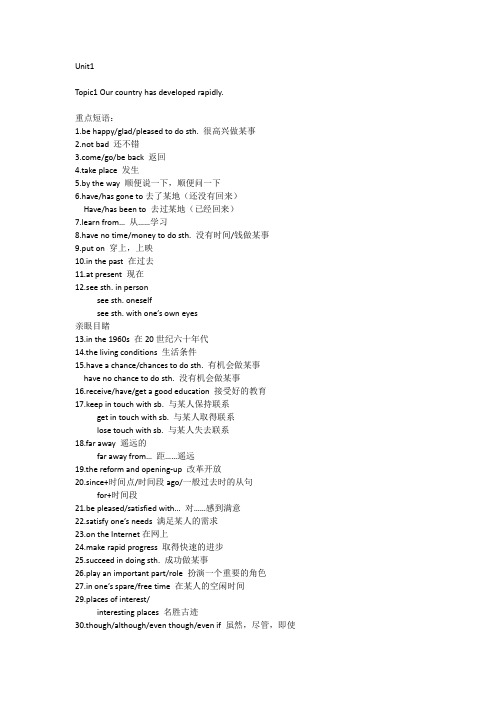
Unit1Topic1 Our country has developed rapidly.重点短语:1.be happy/glad/pleased to do sth. 很高兴做某事2.not bad 还不错e/go/be back 返回4.take place 发生5.by the way 顺便说一下,顺便问一下6.have/has gone to去了某地(还没有回来)Have/has been to 去过某地(已经回来)7.learn from… 从……学习8.have no time/money to do sth. 没有时间/钱做某事9.put on 穿上,上映10.in the past 在过去11.at present 现在12.see sth. in personsee sth. oneselfsee sth. with one’s own eyes亲眼目睹13.in the 1960s 在20世纪六十年代14.the living conditions 生活条件15.have a chance/chances to do sth. 有机会做某事have no chance to do sth. 没有机会做某事16.receive/have/get a good education 接受好的教育17.keep in touch with sb. 与某人保持联系get in touch with sb. 与某人取得联系lose touch with sb. 与某人失去联系18.far away 遥远的far away from… 距……遥远19.the reform and opening-up 改革开放20.since+时间点/时间段ago/一般过去时的从句for+时间段21.be pleased/satisfied with… 对……感到满意22.satisfy one’s needs 满足某人的需求23.on the Internet在网上24.make rapid progress 取得快速的进步25.succeed in doing sth. 成功做某事26.play an important part/role 扮演一个重要的角色27.in one’s spare/free time 在某人的空闲时间29.places of interest/interesting places 名胜古迹30.though/although/even though/even if 虽然,尽管,即使引导让步状语从句,不与but连用,但可与still,yet连用。
(完整版)仁爱英语九年级上册知识点归纳
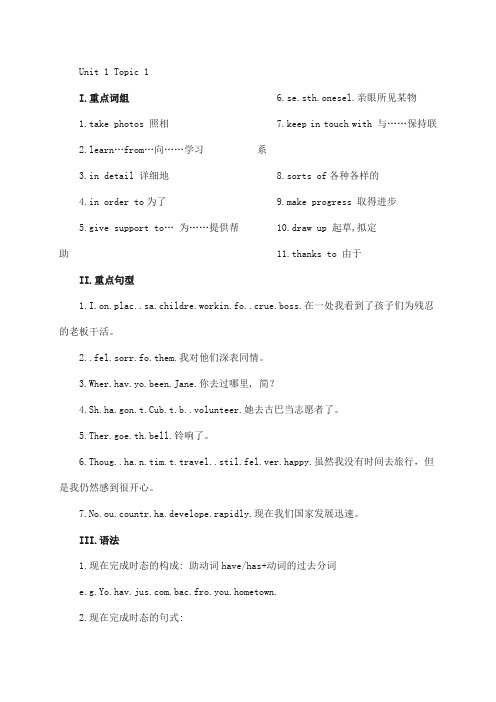
Unit 1 Topic 1I.重点词组1.take photos 照相2.learn…from…向……学习3.in detail 详细地4.in order to为了5.give support to…为……提供帮助6.se.sth.onesel.亲眼所见某物7.keep in touch with 与……保持联系8.sorts of各种各样的9.make progress 取得进步10.draw up 起草,拟定11.thanks to 由于II.重点句型1.I.on.plac..sa.childre.workin.fo..crue.boss.在一处我看到了孩子们为残忍的老板干活。
2..fel.sorr.fo.them.我对他们深表同情。
3.Wher.hav.yo.been.Jane.你去过哪里, 简?4.Sh.ha.gon.t.Cub.t.b..volunteer.她去古巴当志愿者了。
5.Ther.goe.th.bell.铃响了。
6.Thoug..ha.n.tim.t.travel..stil.fel.ver.happy.虽然我没有时间去旅行,但是我仍然感到很开心。
7.No.ou.countr.ha.develope.rapidly.现在我们国家发展迅速。
III.语法1.现在完成时态的构成: 助动词have/has+动词的过去分词.bac.fro.you.hometown.2.现在完成时态的句式:e.g.(1..hav.bee.t.Moun.Huan.wit.m.parents.(2) I haven’t seen him for a long time.(3) Where have you been?(4.——Hav.yo.eve.cleane..room?.——Yes..have..No..haven’t.3.have.ha.been.have/ha.gon.的区别have/has been to sp.表示曾经到过某地—— have/has gone to sp.表示已经去了某地e.g.(1..hav.bee.t.Moun.Huan.wit.m.parents. .(2.Sh.ha.gon.t.Cub.t.b..vo lunteer.Unit 1 Topic 2I.重点词组1. get lost 迷路2. each other 彼此3.at least 至少4take place发生5because of 因为6.b.stric.wit.sb.对某人严格要求.7.carry out 实行8.be short of 缺乏9.take measures to do sth.采取措施做某事10.be known as…作为……而著名11.work well in doing…在……方面起作用12.a couple of 一些13keep up with赶上,跟上II.重点句型1.Hav.yo.foun.hi.yet.你已经找到他了吗?2.——.reall.hat.t.g.shopping.我的确讨厌购物。
仁爱版英语九年级Unit1Topic1知识点
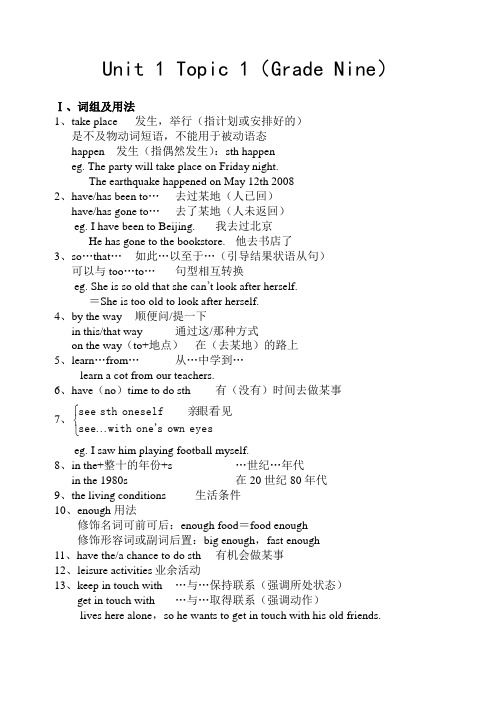
Unit 1 Topic 1(Grade Nine )Ⅰ、词组及用法1、take place 发生,举行(指计划或安排好的)是不及物动词短语,不能用于被动语态happen 发生(指偶然发生):sth happeneg. The party will take place on Friday night.The earthquake happened on May 12th 20082、have/has been to … 去过某地(人已回)have/has gone to … 去了某地(人未返回)eg. I have been to Beijing. 我去过北京He has gone to the bookstore. 他去书店了3、so …that … 如此…以至于…(引导结果状语从句)可以与too …to … 句型相互转换eg. She is so old that she can ’t look after herself.=She is too old to look after herself.4、by the way 顺便问/提一下in this/that way 通过这/那种方式on the way (to+地点) 在(去某地)的路上5、learn …from … 从…中学到…learn a cot from our teachers.6、have (no )time to do sth 有(没有)时间去做某事7、⎩⎨⎧⋯eyes own s one'with see 眼看见oneself 亲 sth see eg. I saw him playing football myself.8、in the+整十的年份+s …世纪…年代in the 1980s 在20世纪80年代9、the living conditions 生活条件10、enough 用法修饰名词可前可后:enough food =food enough修饰形容词或副词后置:big enough ,fast enough11、have the/a chance to do sth 有机会做某事12、leisure activities 业余活动13、keep in touch with …与…保持联系(强调所处状态) get in touch with …与…取得联系(强调动作)lives here alone ,so he wants to get in touch with his old friends.14、far away 遥远(常放句末作后置定语)work in a city far away.far away from+某地离…遥远eg. Their school is far away from here.*如果前有具体数字,far要去掉eg. His home is 9 kilometers away from the school.15、develop 动词:发展,发达developed 形容词:发达的,发展的developing 形容词:发展中的development 名词:发展China is a developing country.16、satisfy(v.)使满意——satisfied(adj.)满意的satisfy sb. 使某人满意satisfy people’s needs 满足人们的需求eg. Well try to satisfy all the guests.be satisfied with …对…感到满意eg. Her parents are satisfied with her exam results.17、not only…but also…不但…而且…连接并列主语时,谓语动词用就近原则Not only my friends but also I am interested in the book.18、care(n.)照料,照顾medical care医疗保健patient care病人护理take care of sb/sth 照顾某人/物=care for…care(v.)关注,在意care about sb/sth 在意某人/物19、make progress 取得进步make great/rapid progress 取得重大/快速进步20、succeed in sth/doing sth 成功做某事21、dream about 梦想,展望22、play a part/role(in sth)在…发挥重要作用,在…扮演重要角色eg. The computer plays an important part in our lives.23、play hide―and―seek 玩捉迷茂24、meet to play cards 聚在一起玩牌25、in one’s spare/free time 在某人的空闲时间26、team sports 团体运动27、in the open air 在户外,露天28、roll iron rings 滚铁环29、go roller skating 滑旱冰30、make a tour abroad 去国外旅游Ⅱ、辨析though ,although ,even though ,even if 都是连词,意为“虽然,尽管,即使”,引导让步状语从句,不与but ,however 连用eg. Though/Although he is only three years old ,he knows a lotⅢ、语法:现在完成时1、结构:助动词have/has+动词的过去分词2、定义:表示过去发生或已经完成的某一动作对现在造成的影响或结果3、常与just ,already ,yet ,ever ,never ,beforefor+一段时间since …,so far ,by now ,these daysin recent years ,in the past …years 等连用4、Tom has already seen the film.(陈述句)Tom hasn ’t seen the film yet.(否定句)⎩⎨⎧t.hasn' he ,has./No he Yes,)一般疑问句( yet?film the seen Tom Has 5、参看课本124Ⅳ、范文Great Changes in My HometownIn the past ten years ,great changes have taken place in my hometown. People in my hometown are living a happy life with the development of our country.Now people in my hometown have lived in beautiful and tall buildings. Roads are getting wider and wider. People ’s living conditions are getting better and better. What ’s more ,children have studied in modern schools and they are getting a good education.I feel very excited about the changes in my hometown and I think my hometown will become.。
(精华版)仁爱版英语九年级上册知识点整理

(精华版)仁爱版英语九年级上册知识点整理本文档对仁爱版英语九年级上册的知识点进行整理,旨在帮助同学们快速回顾和掌握所学内容。
以下是详细的知识点整理:1. 单元一:同一种动物,不同的国家1.1 单词与短语- animal:动物- continent:大洲- natural habitat:自然栖息地- endangered species:濒危物种- behavior:行为1.2 语法与句型- 形容词比较级的构成及用法- 原因状语从句的构成及用法- 定语从句的构成及用法2. 单元二:骑乘的美丽童话2.1 单词与短语- fairy tale:童话- kingdom:王国- castle:城堡- carriage:马车- prince:王子- princess:公主- wicked:邪恶的2.2 语法与句型- 一般过去时的构成及用法- 时间状语从句的构成及用法- 分词作定语的用法3. 单元三:发掘智慧的能力3.1 单词与短语- wisdom:智慧- knowledge:知识- invent:发明- experiment:实验- curiosity:好奇心- observe:观察3.2 语法与句型- 基数词与序数词的用法- 短语动词的构成及用法- 形容词作定语的用法4. 单元四:人人都是明星4.1 单词与短语- superstar:超级明星- talent:才能- concert:音乐会- audience:观众- performance:表演- fame:名声4.2 语法与句型- 定语从句的引导词与用法- 形容词与副词的比较级与最高级的构成及用法- 双重否定的句子构成及用法以上是对仁爱版英语九年级上册的知识点进行的精华整理,希望能对同学们的学习有所帮助。
更详细的内容请参考教材。
英语仁爱版九年级unit1知识点总结

英语仁爱版九年级unit1知识点总结英语仁爱版九年级Unit 1 知识点总结在英语学习的过程中,掌握好每个单元的知识点是非常关键的。
在这篇文章中,我将为大家总结英语仁爱版九年级Unit 1的知识点。
本单元主要包括常用的问候语、介绍自己和他人、谈论年龄和家人等内容。
一、常用问候语在日常生活中,我们经常需要与他人打招呼和问候。
在英语中,常用的问候语有:1. Hello:表示你好,是最常用的问候语。
2. Hi:和Hello的用法相似,表示你好。
3. Good morning/afternoon/evening:表示早上/下午/晚上好。
4. How are you?:表示你好吗?用来询问对方的生活状态。
二、介绍自己和他人在与他人交流时,我们需要学会介绍自己和他人。
下面是一些常用的表达方式:1. My name is…:我的名字是…2. I am… :我是…3. This is…:这是…4. Nice to meet you:很高兴见到你。
5. Where are you from?:你来自哪里?6. I am from…:我来自…三、谈论年龄了解他人的年龄是相互了解和交流的重要内容之一。
以下是一些常用的表达方式:1. How old are you?:你几岁?2. I am… years old:我…岁。
3. What’s your age?:你多大了?4. My age is…:我…岁。
四、家人介绍在单元中,我们也学习了如何介绍家人。
下面是一些相关表达方式:1. This is my father/mother/brother/sister:这是我的父亲/母亲/兄弟/姐妹。
2. His/Her name is…:他/她的名字是…3. He/She is…:他/她是…在学习这些知识点的过程中,我们应该做到多思考、多运用,帮助自己更好地掌握英语。
可以通过与同学练习对话、背诵相关句子等方式来加深记忆。
此外,在学习过程中,我们也要培养良好的学习习惯和练习英语口语的机会。
仁爱版九年级英语上册unit1重要知识点
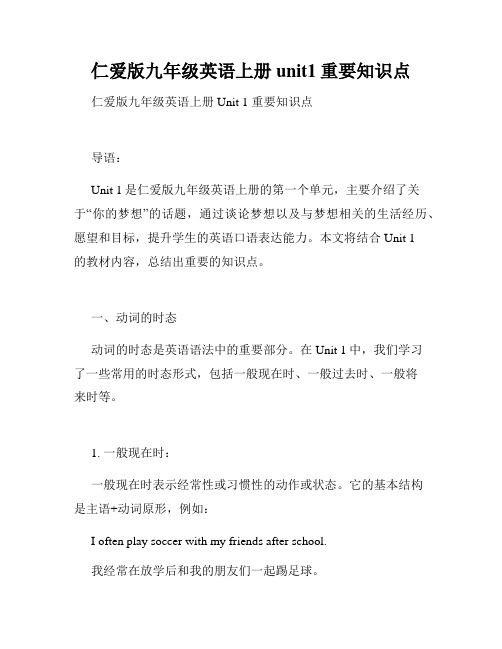
仁爱版九年级英语上册unit1重要知识点仁爱版九年级英语上册Unit 1 重要知识点导语:Unit 1是仁爱版九年级英语上册的第一个单元,主要介绍了关于“你的梦想”的话题,通过谈论梦想以及与梦想相关的生活经历、愿望和目标,提升学生的英语口语表达能力。
本文将结合Unit 1的教材内容,总结出重要的知识点。
一、动词的时态动词的时态是英语语法中的重要部分。
在Unit 1中,我们学习了一些常用的时态形式,包括一般现在时、一般过去时、一般将来时等。
1. 一般现在时:一般现在时表示经常性或习惯性的动作或状态。
它的基本结构是主语+动词原形,例如:I often play soccer with my friends after school.我经常在放学后和我的朋友们一起踢足球。
2. 一般过去时:一般过去时表示过去某个时间发生的动作或状态。
它的基本结构是主语+动词过去式,例如:Last night, I watched an interesting movie with my family.昨晚,我和我的家人一起看了一部有趣的电影。
3. 一般将来时:一般将来时表示将来某个时间要发生的动作或状态。
它的基本结构是主语+will+动词原形,例如:Next week, I will visit my grandparents in the countryside.下周,我将去乡下看望我的祖父母。
二、句型的运用在Unit 1中,我们学习了一些常用的句型,能够帮助我们更好地表达自己的梦想和愿望。
1. What do you want to be when you grow up?当你长大后你想要成为什么?这个句型用来询问对方将来的职业梦想,可以用来提高学生对未来的思考和规划能力。
2. I want to be a/an...我想要成为一个...通过这个句型,我们可以表达自己的梦想和愿望,向他人展示我们对某个职业的向往。
3. Why do you want to be a/an...?你为什么想要成为一个...?这个句型用来询问对方为什么有这样的职业梦想,帮助学生思考自己对某个职业的认知和理解。
仁爱版英语九年级上册Unit1Topic1 知识点总结

九年级上册仁爱版第一单元T1知识点总结Topic 1一、重点词汇:take place 发生,进行volunteer 志愿者bell 钟(铃)声,铃,钟Africa 非洲disabled 残疾的,残废的shut 关闭,关上ever 在任何时候,从来rope 绳子,绳索narrow 狭窄的communication 通讯;交流;交往various 各种各样的;多姿多彩的report 报告;汇报keep in touch with ... 跟……保持联系relative 亲属,亲戚telegram 电报;电文rapidly 快速地,迅速地since 自…以后,从…以来;因为reform 改革,改良reform and opening-up 改革开放satisfy 使满意,使满足medical 医学的;医疗的cellphone = mobile phone 手机,移动电话fax 传真;传真机machine 机器,机械rapid 迅速的,快速的progress 进步,进展,逐步发展make progress 取得进展,取得进步already 已经,早已succeed in doing sth. 成功地做了某事pleased 高兴的leisure 闲暇,空闲hide 躲藏;遮挡;隐瞒hide-and-seek 捉迷藏游戏chess 国际象棋radio 收音机spare 空闲的,空余的recent 近来的,最近的abroad 在国外;到国外二、重点短语not bad 还不错take place 发生so...that... 如此...以至于...take photos 拍照improve my English提升我的英语by the way 顺便说一下for a long time 很长时间take part in 参加during the summer holidays 在暑假期间put on 上演,上映more than 超过,多余in the 1960s 在20世纪60年代living conditions生活条件have a/the chance to do 有机会做... receive a good education 接受良好教育keep in touch with 与...保持联系far away 远离的,遥远的the reform and opening-up改革开放satisfy people’s need 满足人们的需求medical care医疗处理what’s more 而且make progress 取得进步(progress不可数) succeed in doing 成功做...leisure activity 休闲活动enjoy oneself 玩的愉快play an important part in 起...重要作用hide-and-seek 捉迷藏in one’s spare/free time 在某人空闲时stay at home 待在家have a rest/break 休息一下chat on the Internet 网上聊天places of interest 名胜古迹三、课文重要知识点1Section A1.What about you?拓展:提建议句式1) 后接to do: Would you like to do...?2)后接doing: What/ How about doing...?Do you mind doing...?3)后接do: Could / Would / Can you please do...?Let’s do...?2.Not bad. 还不错3.You have just come back from your hometown.考点:现在完成时(1)构成:主语+have/ has+done...变形:否定句:主语+have/ has not+done...一般疑问句:Have/ Has +主语+done...? 回答:肯定Yes 否定No特殊疑问句:如对多长时间进行提问:How long have/ has+主语+done...?(2)标志性副词:just. 另外常见的还有:already yet never ever before recently等。
- 1、下载文档前请自行甄别文档内容的完整性,平台不提供额外的编辑、内容补充、找答案等附加服务。
- 2、"仅部分预览"的文档,不可在线预览部分如存在完整性等问题,可反馈申请退款(可完整预览的文档不适用该条件!)。
- 3、如文档侵犯您的权益,请联系客服反馈,我们会尽快为您处理(人工客服工作时间:9:00-18:30)。
Topic 2 What has happened to the population?一、重点词汇(一)词形转换1. possible (反义词) impossible2. rise (过去分词) risen3. conclude (名词) conclusion4. medicine (形容词) medical5. difficult (名词) difficulty6. less (反义词) more7. excellent (近义词) great/ good 8. different (名词) difference9. come (过去式) came (过去分词) come 10. see (过去式) saw (过去分词) seen 11. peace (形容词) peaceful(二)重点短语1. get lost 走失;迷路hate to go shopping 讨厌去购物hear from sb.=receive/ get a letter from sb. 收到某人的来信be abroad 在国外at least 至少take place = happen 发生China’s one-child policy 中国的独生子女政策be strict with sb. 对某人要求严格the population of China 中国的人口live longer 活得更长medical care 医疗保健control the population 控制人口be known / famous as 以……而闻名work well in doing sth. 在做某事方面很有功效have a long way to go 有很长的路要走be short of 缺乏……one of the greatest problems 最大的问题之一be in trouble 陷入麻烦中/ 在困境中prefer boys to girls 重男轻女offer sb. a good education 提供某人良好的教育a couple of 一些;几个even though = even if 即使have a lot of pressure 有许多压力the differences between A and B A与B之间的区别重点句型We got lost and couldn’t find each other. 我们走失了,互相找不到对方。
It seems that their living conditions were not very good. 似乎他们的生活条件不是很好。
It is possible that Kangkang’s father was the only child in his famil y.康康的父亲有可能是他家中的独生子。
One answer is known as the one-child policy. 其中一项众所周知的措施是独生子女政策.And even though we have made a lot of progress, we have big pollution problems in thecity. 虽然我们已经取得了很大的进步,但是仍存在严重的城市污染问题。
三、重点语言点1.---- I really hate to go shopping. 我真讨厌去购物。
---- So do I . 我也是。
So do I .为倒装句,表示前面提到的肯定情况也同样适合另外一个主体,表“某某也一样”,结构为“so + be /情态动词/ 助动词+ 主语”。
如:Jim is a student, so is Tom. 吉姆是一名学生,汤姆也是。
Jim can swim, so can Tom. 吉姆会游泳,汤姆也会。
Jim likes sports, so does Tom. 吉姆喜欢运动,汤姆也喜欢。
如表前面不怎样,后面“也不”怎样时,其结构为“ neither/ nor + be /情态动词/ 助动词+ 主语”。
如:Jim wasn’t Chinese, neither/ nor were they.吉姆不中国人,他们也不是。
Jim can’t speak Japanese, neither can I .吉姆不会说日语,我也不会。
Jim didn’t go there, neither did I .吉姆没去那儿,我也没去。
如前后两句表达的是同一个主体,则不能倒装,表“的确如此”。
如:Jim is a good student. So he is. 吉姆是一名好学生,的确如此。
Jim swims well. So he does. 吉姆游泳很好,的确如此。
2.At that time, China was the country with the largest population in the world.那时,中国是世界上人口最多的国家。
population为不可数名词,表示人口的多少只能用“large”或“small”修饰,提问人口用“what”, 如:The population of Shanghaiis larger than that ofBeijing. 上海的人口比北京多。
What’s the population ofChina?= How many people are there inChina?中国的人口有多少?3. Great changes have taken place in China. 中国发生了巨大变化。
take place 指必然性的“发生”或有计划、安排之内的“举行”。
如:The meeting will take place next Friday. 会议将在下周五举行。
happen 指偶然的、没有预料的“发生“,其结果往往给人带来不幸或麻烦。
如:The accident happened yesterday. 事故发生在昨天。
※两者都不用于被动语态。
The population has increased a lot. 人口增长发很多。
increase 可作及物动词也可作不及物动词。
其含义是“增长,增加,加强”等。
increase by… 指“增加了……”;increase to…指“增加到……”…, and about one fifth of the people in the world live inChina.而且世界上大约五分之一的人口生活在中国。
one fifth 是分数表达法。
英文分数表达法:分子为基数词,分母为序数词,先读分子后读分母。
当分子大于1时,分母的序数词则变为复数,直接在词尾加“s”如:one fourth 四分之一;three fourths 四分之三;one second 二分之一;two thirds 三分之二6.It has worked well in controlling China’s population.它在控制人口数量方面取得了显著的功效。
work well in doing sth. 表“在……方面很有功效”, 如:Doing eye exercises works well in protecting our eyesight.做眼保健操在保护视力方面很有功效。
7. Because of our large population, we are short of energy and water.be short of…表“缺乏……”, 如:She is always short of money at the end of every month. 每个月底她总是缺钱。
be short for… 表“是……的缩写”, 如:TV is short for television. TV是television的缩写形式.8. Can all Chinese families offer their children a good education?所有的中国家庭都能给他们的的孩子提供良好的教育吗?offer 表“(主动)给予,提供”offer sb. sth. “提供某人某物”如:I offered him a glass of wine. 我敬了他一杯酒。
offer to do sth. “(主动)提出做某事” 如:She offered to cook for her mother. 她提出帮她妈妈煮饭。
I can’t go shopping in big stores unless I travel for a couple of hours.我得花几个小时,才能到大的商场购物。
a) unless = if not 表“除非…; 如果不”,引导条件状语从句。
如:I won’t go unless I hear from you. = I won’t go if I don’t hear from you.如果你不通知我,我就不去。
Unless B ill studies hard, he’ll fail in the exam. 如果比尔不努力, 他不会通过考试的.b) a couple of… 表“几个人或几件事”, 如:a couple of years ago 几年前; a couple of students 几个学生couple 指任何两件同类的东西; 如:a couple of watches 两只手表;five couples of cats 五对猫pair 指两件不可分开使用的东西,它们可指两件互不相连的东西(鞋子、袜子等),也可指两部分构成的一件东西(裤子、剪刀等)。
如:a pair of shoes 一双鞋子 a pair of pants 一条裤子四、重点语法现在完成时常与下列表不明确的状语连用:1.already 和yetalready “已经”(多用于肯定陈述句),如:He has already gone home. 他已经回家了。
yet “已经; 还”(用于否定句或疑问句),如:Have you found him yet? 你已经找到他了吗?I haven’t finished my homework yet.我还没完成作业。
※ already 也可用于疑问句,表“出乎意料或惊奇”Have you finished your homework already? 难道你已经完成作业了?2.ever 和neverever “曾经”(多用于疑问句,问初次经历),如:I have ever been abroad. 我曾出过国。
